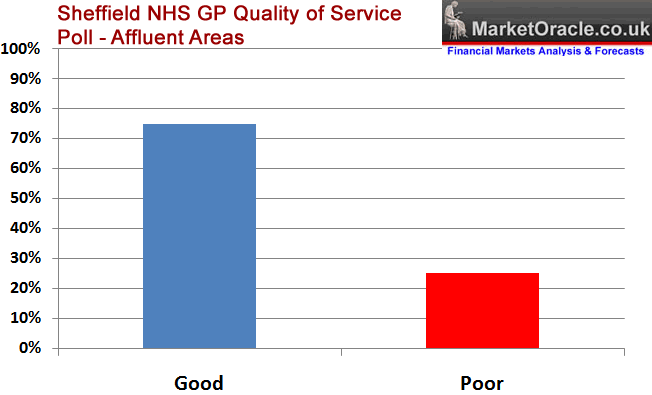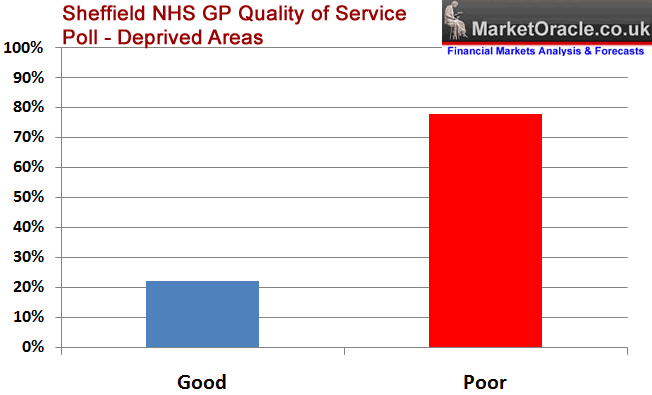

25th June 2009
A string of reports have highlighted the large disparity in healthcare provision between that for affluent area's and deprived areas right across the country. Where the greater the deprivation the less funds tend to be allocated towards funding of health services for the deprived area, hence the oft mentioned post code lottery.
Analysis by the Health Service Journal revealed that "of the budgets allocated to GP's to pay for drugs and hospital care for their patients show that the wealthiest tenth of the population are, on average, more than 2 per cent overfunded while the poorest tenth are 2 per cent underfunded.
NHS Alliance chief executive Mike Sobanja said money was "in the wrong place".
"Being underfunded means the GP's won't be able to respond to the individual health needs of their population. It means someone else has more resources than they are entitled to.
David Pink, chief executive of new patient representative body National Voices, said the trend was very worrying. "We can't have an NHS funding system that favours areas of the healthy and wealthy at the expense of areas of deprivation and chronic illness."
This analysis is inline with the Market Oracle's own research over the past 3 years as seen in the most recent on-going Market Oracle opinion poll of Patients experience of GP services across the city of Sheffield:


The wide gap in the quality of healthcare is not just a case of polled patient experience but being borne out in the huge gap in life expectancy in the city between affluent wards and deprived wards as voiced by the Lib Dem Leader and Sheffield MP Nick Clegg :
"It is an outrage that social mobility has slowed, not increased, under the Blair-Brown years. It is an outrage that in Sheffield, where I’m an MP, life expectancy in the poorest wards is a full 14 years below the life expectancy of those living in the wealthiest wards. Your life chances are now set by the circumstances of your birth as never before."
The difference in the quality of health care is not so surprising given that those that reside in affluent areas tend to be from the higher educated professional middle classes that would not stand for incompetent healthcare services and hence put pressure on the local PCT's to channel funds into these areas. Whilst those in deprived wards have a greater tendency to suffer in silence in the face of under resourced and a barely competent health service.
Whilst affluent wards of the city are in receipt of a series of new initiatives towards improving healthcare, patients of deprived wards are witnessing cut backs in the quality of service as illustrated in numerous local press stories, where GP's scrape the bottom of the excuses barrel for failure to deliver i.e. Dad's fury at GP snub.
The Labour government recognising the disparity in GP services in many areas of the country during 2008 embarked upon a programme of introducing poly clinics or super surgeries in the face of much resistance from GP's which included the British Medical Association (BMA) delivering a petition of more than 1 million signatures to Downing Street against the implementation of 150 ‘Super Surgeries'.
The then Health Minister, Ben Bradshaw lashed out at the scare tactics accusing the BMA of "misleading and mendacious" behaviour in getting patients to sign up to the petition.
"I am not surprised the BMA has collected so many signatures, given the misleading and mendacious nature of its campaign.
"If I were to run a campaign making false claims that something terrible was about to happen, a lot of people would sign my petition too.
"We have received widespread anecdotal evidence of patients feeling pressurised to sign the petition as well as practices telling their patients blatant inaccuracies about local plans." he said.
Sheffield's own super surgery situated in the city central opened in April this year, which aims to 'hopefully' bridge some of the ever widening gap between affluent wards and deprived wards of the city.
By Nadeem Walayat
Copyright © 2005-2010 Marketoracle.co.uk (Market Oracle Ltd). All rights reserved.
Nadeem Walayat has over 25 years experience of trading derivatives, portfolio management and analysing the financial markets, including one of few who both anticipated and Beat the 1987 Crash. Nadeem's forward looking analysis focuses on UK inflation, economy, interest rates and housing market. He is the author of three ebook's - The Inflation Mega-Trend; The Interest Rate Mega-Trend and The Stocks Stealth Bull Market Update 2011 that can be downloaded for Free.
Nadeem is the Editor of The Market Oracle, a FREE Daily Financial Markets Analysis & Forecasting online publication that presents in-depth analysis from over 600 experienced analysts on a range of views of the probable direction of the financial markets, thus enabling our readers to arrive at an informed opinion on future market direction. http://www.marketoracle.co.uk
Copyright © 2013 NHSSheffield.Com - A Market Oracle Public Service
Disclaimer: The above is a matter of opinion provided for general information purposes only and is not intended as personal health advice. Information and analysis above are derived from sources and utilising methods believed to be reliable, but we cannot accept responsibility for any consequences as a result of this analysis. Individuals should always consult with their health advisors before engaging in any treatment.
The dynamic version of NHSSheffield.com will go live in due course.